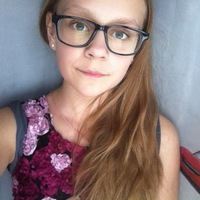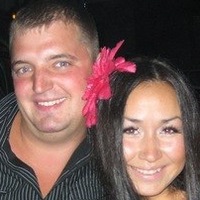
Хелп срочно! Заранее спасибо!Mr. and Mrs. Wormwood were our neighbours. They had two ________CHILD__________. Their son Michael __________NOT/DIFFER________ from the other children very much, but their daughter Matilda was a brilliant child.
By the time she was five, Matilda was able to read very well. She studied every magazine and newspaper that she _________CAN_________ find around the house. Actually, she read _________WELL_________ than most school pupils. One afternoon when the parents were out of the house, Matilda put on _________SHE_________ dress and shoes and went to the library. The librarian was surprised to see such a small child.
"Are you here for the _________ONE_________ time? Would you like me to find a nice book with lots of pictures for you?" she asked.
"No, thank you, I _________FIND_________ what I need," answered Matilda and pointed to a thick book of fairy tales. Then she added, “I ________COME__________ for a new book as soon as I finish this one”.
The librarian was really shocked when she saw Matilda only two days later.
“I wish all children _________LIKE_________ reading so much,” the librarian said. From that day on Matilda went to the library every afternoon. Dr Michael Werner says that he has eaten nothing for four years. The German _________SCIENCE_________ explains that he gets all his energy from sunlight. He says he drinks only water and ________DIFFER__________ fruit juices. Dr Werner has written an _________EXCITE_________ book about his experiences. In it he says that when he started the experiment he even put on weight.
He says: "I can't really give an ________EXPLAIN_________ of what’s happening to me; perhaps I just believe in my theory."
Dr Werner’s colleagues say that only plants can produce energy from the sun, and they cannot explain how he is able to stay ________HEALTH_________.
“This case ,_________PROBABLE_________, needs a lot more research before we will be able to explain it,” they say.
What is the largest animal on the planet? My uncle says that it’s the blue whale. He is a ______SCIENCE______ and knows a lot about them. The blue whale is an endangered animal, nowadays, people protect whales. ______FORTUNATE______, They study these ______BEAUTY______ animals instead of killing them. Blue whales are not______DANGER______ to people. It’s ______BELIEVABLE______ but these huge whales eat plankton – small plants and animals.It was getting dark when Laura got to her sister’s place. The entrance door ______LOCK______.
Laura pressed the doorbell and ______HEAR______ quick footsteps. “It’s so nice of you to come,’ Laura’s sister Betty opened the door.
“Come in. We ______PUT______ a meat pie into the oven. I think it’ll be ready in forty minutes or so. You aren’t very hungry, are you?”
Betty was seven years ______YOUNG______ than Laura, but she was much better at housekeeping.
When Laura entered the house, she saw four ______WOMAN______ in the sitting room.
They nodded and went on talking. “Where’s Ken?” asked Laura. “He ______REPAIR______ his car in the garage,” Laura said.
“He ______JOIN______ us soon.”
Ответы на вопрос

Похоже, что в вашем вопросе требуется не только грамматический анализ, но и помощь в заполнении пропусков в тексте. Давайте по порядку разберём все пропуски.
Mr. and Mrs. Wormwood were our neighbours. They had two CHILD__.
- Ответ: children. Это множественная форма существительного "child".
Their son Michael __NOT/DIFFER from the other children very much, but their daughter Matilda was a brilliant child.
- Ответ: did not differ. В отрицательных предложениях с глаголом "differ" в прошлом времени используется форма "did not" (или сокращённая "didn't"), а сам глагол стоит в основной форме.
By the time she was five, Matilda was able to read very well. She studied every magazine and newspaper that she CAN find around the house.
- Ответ: could. В данном контексте употребляется прошедшее время глагола "can" (could), так как действие относится к прошедшему времени (когда ей было пять лет).
Actually, she read WELL than most school pupils.
- Ответ: better. При сравнении используется форма сравнительной степени прилагательного или наречия. В данном случае — "better" (лучше).
One afternoon when the parents were out of the house, Matilda put on SHE dress and shoes and went to the library.
- Ответ: her. Используется притяжательное местоимение "her", так как речь идет о вещах, принадлежащих Матильде.
The librarian was surprised to see such a small child. "Are you here for the ONE time? Would you like me to find a nice book with lots of pictures for you?" she asked.
- Ответ: first. Вопрос "Are you here for the first time?" означает "Ты здесь в первый раз?".
"No, thank you, I FIND what I need," answered Matilda and pointed to a thick book of fairy tales.
- Ответ: have found. Используется время Present Perfect, так как действие завершено, но имеет связь с настоящим моментом.
Then she added, “I COME__ for a new book as soon as I finish this one.”
- Ответ: will come. Это будущее время, которое указывает на действие, которое произойдёт в будущем.
The librarian was really shocked when she saw Matilda only two days later. “I wish all children LIKE reading so much,” the librarian said.
- Ответ: liked. Здесь используется Past Simple в условном предложении (wish + Past Simple), которое выражает сожаление о настоящем.
From that day on Matilda went to the library every afternoon. Dr. Michael Werner says that he has eaten nothing for four years. The German SCIENCE explains that he gets all his energy from sunlight.
- Ответ: scientist. "Scientist" — существительное, обозначающее учёного.
He says he drinks only water and DIFFER__ fruit juices.
- Ответ: different. Здесь используется прилагательное в степени сравнения (different), так как речь идёт о сравнении различных видов соков.
Dr Werner has written an EXCITE book about his experiences.
- Ответ: exciting. В данном случае используется прилагательное в форме настоящего времени (exciting) для описания книги.
In it he says that when he started the experiment he even put on weight. He says: "I can't really give an EXPLAIN_ of what’s happening to me; perhaps I just believe in my theory."
- Ответ: explanation. Это существительное, которое означает объяснение.
Dr Werner’s colleagues say that only plants can produce energy from the sun, and they cannot explain how he is able to stay HEALTH_.
- Ответ: healthy. Здесь используется прилагательное в форме "healthy", которое описывает состояние здоровья.
“This case, PROBABLE, needs a lot more research before we will be able to explain it,” they say.
- Ответ: probably. В данном контексте нужно наречие "probably" для уточнения вероятности.
What is the largest animal on the planet? My uncle says that it’s the blue whale. He is a SCIENCE and knows a lot about them.
- Ответ: scientist. Здесь снова подходит существительное "scientist", так как речь идет о профессии.
The blue whale is an endangered animal, nowadays, people protect whales. FORTUNATE, They study these BEAUTY animals instead of killing them.
- Ответ: Fortunately, beautiful. "Fortunately" — наречие, которое выражает удачное обстоятельство, а "beautiful" — прилагательное, описывающее животных.
Blue whales are not DANGER to people. It’s BELIEVABLE but these huge whales eat plankton – small plants and animals.
- Ответ: dangerous, believable. В первом случае прилагательное в форме "dangerous" (опасные), во втором — "believable" (вероятно).
It was getting dark when Laura got to her sister’s place. The entrance door LOCK.
- Ответ: was locked. Прошедшее время пассива — "was locked" (была заперта).
Laura pressed the doorbell and HEAR quick footsteps.
- Ответ: heard. Прошедшая форма глагола "hear" — "heard".
“It’s so nice of you to come,’ Laura’s sister Betty opened the door. “Come in. We PUT a meat pie into the oven. I think it’ll be ready in forty minutes or so.
- Ответ: have put. Это форма Present Perfect, так как действие имеет результат в настоящем.
You aren’t very hungry, are you?” Betty was seven years YOUNG than Laura, but she was much better at housekeeping.
- Ответ: younger. Здесь используется сравнительная форма прилагательного "young" — "younger".
When Laura entered the house, she saw four WO___.
- Ответ: women. Множественная форма существительного "woman" — "women".
Надеюсь, это поможет!
Похожие вопросы









Топ вопросов за вчера в категории Английский язык









Последние заданные вопросы в категории Английский язык





-
Математика
-
Литература
-
Алгебра
-
Русский язык
-
Геометрия
-
Английский язык
-
Химия
-
Физика
-
Биология
-
Другие предметы
-
История
-
Обществознание
-
Окружающий мир
-
География
-
Українська мова
-
Информатика
-
Українська література
-
Қазақ тiлi
-
Экономика
-
Музыка
-
Право
-
Беларуская мова
-
Французский язык
-
Немецкий язык
-
МХК
-
ОБЖ
-
Психология
-
Физкультура и спорт
-
Астрономия
-
Кыргыз тили
-
Оʻzbek tili











